Cowboy from Brooklyn

Brief Synopsis
Cast & Crew
Lloyd Bacon
Dick Powell
Pat O'brien
Priscilla Lane
Dick Foran
Ann Sheridan
Film Details
Technical Specs

Synopsis
Singer Elly Jordan, a Brooklyn man who is terrified of animals, ends up broke along with his two musical partners at Hardy's Dude Ranch in Two Bits, Wyoming. The Hardys, Ma and Pop, daughter Jane and son Jeff, hire the men to play for the dudes. Sam Thorne, Jane's self-appointed boyfriend, ranch cowhand and amateur crooner, is jealous of Jane's interest in Elly. Elly is so successful as a cowboy singer, that when theatrical agent Ray Chadwick arrives at the ranch on a vacation and hears him, he signs Elly immediately. Chadwick thinks that Elly is a real cowboy and Jane coaches him to talk like one. In spite of his fear of animals, he gets away with the deception. He makes a successful screen test as a cowboy, using the name Wyoming Steve Gibson, but he and Chadwick, who now knows the truth, fear that the deception will be revealed when the movie people arrive in New York from Hollywood with Elly's contract. Meanwhile, Jane and some of the ranch people are traveling East as well so Sam can sing on Captain Rose's Amateur Hour in New York. Jane tells Sam that she is in love with Elly and Sam is so angry that when he isn't a big success on the show, he blurts out the truth about Elly's background. To prove that Elly is on the level, Chadwick and his assistant Pat Dunn suggest that he compete in a rodeo. They take Elly to Professor Landis, who hypnotizes him. Under hypnosis, Elly leaps on a horse, rides to Madison Square Garden, enters the bulldogging contest and sets a new record. He sneezes and wakes from the hypnosis, but the movie people are convinced that he is a real cowboy. He signs the contract and kisses Jane to seal the deal.

Director

Lloyd Bacon
Cast

Dick Powell
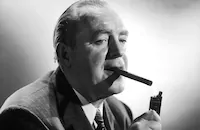
Pat O'brien

Priscilla Lane

Dick Foran
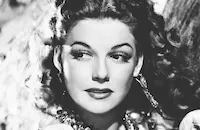
Ann Sheridan
Johnnie Davis
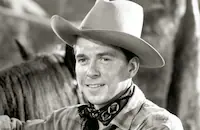
Ronald Reagan
Emma Dunn
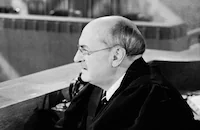
Granville Bates

James Stephenson
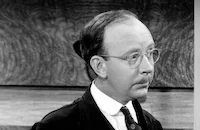
Hobart Cavanaugh

Elizabeth Risdon
Dennie Moore

Rosella Towne
May Boley
Harry Barris
Candy Candido
Donald Briggs

Jeffrey Lynn

John Ridgely

William Davidson
Mary Field
Monte Vandergrift
Eddy Chandler
Cliff Saum
Sam Hayes
Jack Wise
Eddie Graham
Don Marion

Jack Mower
John Harron
Wen Niles
John T. Murray
George Hickman
Dorothy Vaughan
Jimmy Fox
Stuart Holmes
Mary Gordon
James Nolan
John Hiestand
Jack Moore
Ben Hendricks

Emmett Vogan
Crew
Milo Anderson
Earl Baldwin
Adolph Deutsch
Lou Edelman
Arthur Edeson
Leo F. Forbstein
David Forrest
James Gibbon
Esdras Hartley
Dick Mayberry
Johnny Mercer
Dolph Thomas
Jack L. Warner
Harry Warren
Richard Whiting

Film Details
Technical Specs

Articles
Cowboy from Brooklyn - Cowboy From Brooklyn
By the time Cowboy from Brooklyn was in production, its star Dick Powell was ready for a change. The boyishly handsome actor had made many successful early musicals for Warner Bros., but the parts were fluffy, and he was getting older and was ready to move on to more substantial roles. In addition, the reign of the lavish musicals Warner Bros. usually produced was coming to an end, and the studio didn't quite know what to do with their aging singing star. Powell had been one of the studio's top box office draws for years, and he felt that this status would give him some leverage about what roles he would take. Warner Bros., however, believed that a star should stick with the kind of material that had made him popular. He was stuck, and just two years later Powell left the studio permanently to broaden his horizons as an actor.
Richard Whiting and Johnny Mercer were hired to write the songs in Cowboy from Brooklyn, and the pair completed such tunes for it as "I Got a Heartful of Sunshine," "Ride, Tenderfoot, Ride," and "I'll Dream Tonight", sung by Powell. When Richard Whiting suffered a fatal heart attack during the film's production, however, songwriter Harry Warren was brought in to complete the remaining songs with Johnny Mercer. The remarkably talented and prolific Warren, who was born in Brooklyn himself, co-wrote "Howdy Stranger" and the film's title song "Cowboy from Brooklyn" with Mercer.
Cowboy from Brooklyn has a fine supporting cast including the always reliable Pat O'Brien as the fast-talking talent scout Roy Chadwick, Priscilla Lane as Powell's love interest Jane, Ann Sheridan as Chadwick's sister Maxine, and a young Ronald Reagan as press agent Pat Dunn. Pat O'Brien was an old standby for this kind of slick fast-talking role, and Cowboy from Brooklyn marked his sixth and final film opposite Dick Powell. Ronald Reagan, who was still green as an actor when he appeared in this film, would go on to count both Dick Powell and Pat O'Brien among his best friends.
Cowboy from Brooklyn was clearly meant as a good-natured jab at the new breed of "singing cowboy" movies that had brought stars like Gene Autry and Roy Rogers to the masses. The radio show in the movie, Captain Rose's Amateur Hour, was meant as a spoof of the popular long-running radio show Major Bowes' Original Amateur Hour, whose most famous discovery was Frank Sinatra. Cowboy from Brooklyn was remade at Warner Bros. in 1948 as Two Guys from Texas starring Dennis Morgan and Jack Carson.
Producer: Louis F. Edelman, Hal B. Wallis, Jack L. Warner
Director: Lloyd Bacon
Screenplay: Robert Sloane, Louis Pelletier, Earl Baldwin
Cinematography: Arthur Edeson
Film Editing: James Gibbon
Art Direction: Esdras Hartley
Music: Adolph Deutsch
Cast: Dick Powell (Elly Jordan), Pat O'Brien (Roy Chadwick), Priscilla Lane (Jane Hardy), Dick Foran (Sam Thorne), Ann Sheridan (Maxine Chadwick), Johnnie Davis (Jeff Hardy).
BW-77m. Closed captioning.
by Andrea Passafiume

Cowboy from Brooklyn - Cowboy From Brooklyn
Ronald Reagan, 1911-2004 - TCM Remembers Ronald Reagan
Ronald Reagan, the actor turned elected official whose fascinating career saw him develop as a contract player for Warner Brothers studios, to a politician who fulfilled his ambitions by becoming the 40th President of the United States, died at his home in Los Angeles on June 5 after a long battle with Alzheimer's disease. He was 93.
He was born Ronald Wilson Reagan on February 6, 1911 in Tampico, Illinois to John and Nelle Reagan. When Reagan was nine, his family settled down in the small community of Dixon, about 100 miles west of Chicago. After high school, Reagan enrolled in Eureka College, a small Christian school near Peoria. He graduated in 1932 with a degree in Economics, and pursued a career in broadcasting. His first gig was as a part-time announcer at WOC in Davenport, Iowa. Within a year, WOC had merged with its big-sister station, WHO in Des Moines, and Reagan was hired as a sports announcer.
In the spring of 1937, Reagan drove to Southern California to catch the Chicago Cubs in spring training on Santa Catalina Island. While he was in California, he wrangled a screen test and signed a contract for $200 a week with Warner Brothers. His film debut was rather inauspicious; he portrayed a radio announcer in an innocuous comedy Love is on the Air (1937). He made a few more "B" programmers like Hollywood Hotel (also 1937), and Girls on Probation (1938), before getting his first prominent role opposite Bette Davis in the popular tearjerker, Dark Victory (1939).
Although he seldom got credit for being a good actor, there was no denying that Reagan held his own given the right material: Knute Rockne, All American as the doomed Notre Dame football hero George "The Gipper" Gipp, where he delivered the film's immortal line "Win one for the Gipper!"; Santa Fe Trail in which he ably supports Errol Flynn in one of the boxoffice hits of its era (both 1940); Kings Row (1941), featuring one of his finest performances as a small-town playboy whose legs are amputated by a careless surgeon; and Desperate Journey (1942) where he again supported Flynn in an exciting action picture.
Due to his poor eyesight, Reagan didn't see any action in World War II, so the studio heads assigned him to star in a series of patriotic films produced by the First Motion Picture Unit of the Army Air Forces in Culver City. Between 1942-45, Reagan starred in over 400 of these films. After the war, Reagan still found some good roles: The Voice of the Turtle (1947) proved he had a deft hand at light comedy opposite Eleanor Parker; The Hasty Heart (1949) offered another underrated performance as he ably portrayed the Yank in John Patrick's much heralded wartime play; and Storm Warning (1950) was a slick melodrama that cast Reagan as a crusading District Attorney determined to bring the KKK in a small southern town, with the help of Doris Day and Ginger Rogers!
It was around this time that Reagan became involved in politics. In 1947, he began a five-year term as president of the Screen Actors Guild (SAG), and testified in October of that year before the newly formed House Un-American Activities Committee (HUAC). He identified suspected Communists Larry Parks, Howard Da Silva and Alexander Knox, all of whom were subsequently called to testify, and subsequently blacklisted. Later records showed Reagan was so concerned about the Communist influence in Hollywood, that he became an FBI informer.
As Reagan became steeped in his political career, his parts throughout the '50s became inferior: the notorious Bedtime for Bonzo (1951); the coy "sex" comedy She's Working Her Way Through College (1952) that cast him as a college professor who romances a stripper! (Virginia Mayo); Cattle Queen of Montana (1955), a sluggish Western that even the redoubtable Barbara Stanwyck couldn't save; and finally Hellcats of the Navy (1957), a stodgy war picture that would be his only film that co-starred his wife Nancy (Davis).
Television offered some salvation. For eight years, (1954-62), Reagan served as the host of General Electric Theater, a televised series of dramas. He also found a niche as GE's goodwill ambassador to employees and to civic and business groups around the country, furthering his taste and honing his craft as a public official. By the mid '60s, Reagan would move into politics entirely, save for one last film, the thrilling The Killers (1964), Reagan's only known villainous role, as a murderous gangster. That same year, he actively campaigned for Republican Presidential candidate Barry Goldwater, although Goldwater lost to Lyndon B. Johnson.
Reagan whose profile was riding high, had cemented his future as a successful politician. In 1966, he ran against incumbent Governor Pat Brown for the state of California and won, serving successfully for two terms until 1974.
Reagan began an all-out, two-year drive to wrest the 1976 nomination from incumbent Gerald R. Ford, an appointed vice president who became president on the resignation of Nixon. Reagan fell short by a handful of delegates to the Republican national convention. But Ford lost to Jimmy Carter, and Reagan became the front-runner to challenge Carter in 1980. After defeating Carter, Reagan held two terms as President of the United States (1981-89). After his second term was over, he retired quietly in California. In 1994, it was revealed to the media that Reagan was suffering from Alzheimer's disease; he had been kept out of the public eye since then.
He was married briefly to actress Jane Wyman (1940-48), and had two children; a daughter Maureen and an adopted son, Michael. In 1952, he married a budding film starlet, Nancy Davis, who bore him two more children; a daughter, Patty; and a son, Ronald Jr. Ronald Reagan is survived by Nancy, Michael, Patty and Ron Jr. His daughter Maureen died of Melanoma in 2001 at the age of 60.
by Michael T. Toole
Ronald Reagan, 1911-2004 - TCM Remembers Ronald Reagan
Quotes
Trivia
The radio amateur hour was a spoof of radio program "Major Bowes' Original Amateur Hour", which was very popular at the time. It is chiefly noted for the discovery of Frank Sinatra.
Notes
The film's working titles were Dude Rancher, Howdy Stranger and The Brooklyn Cowboy. Captain Rose's Amateur Hour was intended as a burlesque of the long running radio program Major Bowes' Original Amateur Hour, whose most famous discovery was Frank Sinatra. The film was remade by Warner Bros. in 1948 as Two Guys from Texas, directed by David Butler and starring Dennis Morgan and Jack Carson.

Miscellaneous Notes
Released in United States Summer July 9, 1938
Released in United States Summer July 9, 1938















